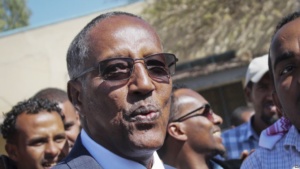Ruling party candidate Muse Bihi Abdi has been declared the winner of the presidential election in the breakaway republic of Somaliland.

The electoral commission said Bihi won 55 percent of the vote compared to 40 percent for Abdurahman Mohamud Abdullahi, the opposition Wadani party candidate.
Faisal Ali Waraabe, of the For Justice and Development party (UCID), finished third with about 4 percent of the vote.
Electoral Commission Chairman Abdikadir Iman Warsame, who announced the results in Hargeisa Tuesday, said the election was “peaceful, free and fair”
The announcement came eight days after hundreds of thousands of voters cast ballots at more than 1,600 polling stations.
Bihi would replace outgoing President Ahmed Mohamed Mohamoud, who chose not to seek another term. He is Somaliland’s fifth president since the region broke away from the rest of Somalia in 1991.
The new President, Bihi, was born in a rural part of Hargeisa in 1948.
In 1985, as an air force military colonel, he joined the Somali National Movement, (SNM), a rebel group that fought for secession from Somalia.In 1993, after the collapse of the former Somali military government, he became Somaliland’s interior minister.
In 2002, he became a member of the executive committee of the ruling Kulmiye party, where he was named deputy chairman in 2008 and chairman in 2015.
President-elect Bihi will serve a five-year term with an option for a second term. His central agenda is how to win international recognition for Somaliland.
Somalia wants Somaliland to be part of a single Somali state. But Somaliland, which used to be a British colony and broke away from the rest of Somalia in 1991, wants to be a separate country.
Since its formation it has been more stable than Somalia and democratic elections have been commonplace.
Political tension mounted in Somaliland following the election, after the Wadani party candidate Abdirahman Mohamed Abdullahi said he would not accept what he termed the “massively rigged and corrupted exercise.”
Abdullahi questioned the transparency of the election and accused the current government of arresting his representatives at polling stations to steal votes and commit fraud.
“The election was not [a] free and fair election because members of our party representatives and supporters were arrested on the Election Day and after,” said Abdullahi. “And then we found out that the election was massively corrupted and rigged.”
Wadani party members withdrew from the counting process, saying they had evidence of fake ballots smuggled out of the polling stations in at least three Somaliland regions.
The allegations were later denied by Electoral Commission Chairman Warsame, who said there was no ballot stuffing or other irregularities.
On Thursday, at least two people were killed in protests that followed the opposition party’s claims of alleged election fraud.
Abdullahi then called on his supporters to show calm and asked the leaders of the current government to release party members from jails.
The head of a British-funded team of 60 international observers, who monitored the vote, said last week they saw some minor infringements of voting rules, but agreed the overall voting process met international standards.
“We determined from our observations that there were not [irregularities] of sufficient scale to undermine the integrity of the electoral processes,” said Michael Walls, a senior lecturer in the Development Planning Unit at University College London.
Kindly follow us on twitter:@AfricanVoice2








